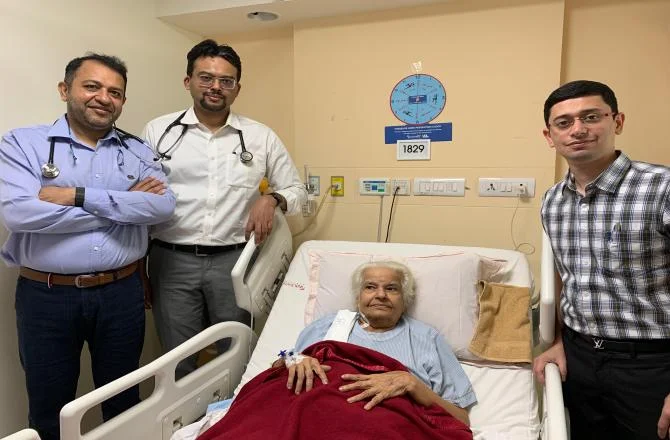A team of skilled doctors consultant interventional cardiologists Dr Ankur Phatarpekar, Dr Haresh Mehta, Dr Kayan Siodia alongwith cardiothoracic surgeon Dr Mangesh Kohale , interventional radiologist Dr Bhavesh Popat, anaesthetist Dr Neeraj Barnwal, physician Dr Brajesh Gupta and Consultant Physician Dr Zaheer Virani successfully treated an 83-year-old woman suffering from a heart attack. She got a new lease of life through a minimally invasive, life-saving procedure called Transcatheter Aortic Valve Replacement (TAVR) wherein a Third Generation Leak-Proof Valve was placed high up in the heart to regulate the obstructed blood flow to the heart, which improves the survival chances of the patient.
83-year-old Dnyaneshwari Swami, a resident of Mumbai suddenly encountered chest pain and shortness of breath. The family panicked and admitted her to Wockhardt Hospitals in Mumbai Central wherein she was diagnosed with a heart attack. Doctors carried out Angioplasty and saved her life.
Dr Ankur Phatarpekar said, “On arrival, the patient underwent, ECG & 2DEcho where it was revealed that she suffered from a heart attack and one of her three arteries of heart was occluded (occlusion means the partial or complete obstruction of blood flow in a coronary artery). The patient also had other co-morbidities such as low blood pressure and kidney problem. The blood clot was removed using aspiration, and the affected session was treated using a drug-eluting stent, and she took about 7 days to recover completely. During the 2DEcho it was also found that the patient had severe Aortic Stenosis (that is a narrowing of the aortic valve opening). It restricts the blood flow from the left ventricle to the aorta and may also affect the pressure in the left atrium (one of the four chambers of the heart, located on the left posterior side) with heart-pumping of 35 per cent.”
Instead of performing high-risk open-heart surgery, a novel transcatheter aortic valve replacement (TAVR), was carried out to aid the normal function of heart valves. “TAVR is a minimally invasive procedure to replace a narrowed aortic valve that fails to open properly (aortic valve stenosis). It is a boon for the patients who are not candidates for other treatment options because of their age, overall health or other medical issues. The goal of TAVR is to implant a new, artificial valve to take over the job of the damaged aortic valve,” explained Dr Phaterpekar.
Dr Haresh Mehta added, “A catheter was used to manoeuvre and place the new Third Generation Leak-Proof Valve, which slips inside the old valve. Once placed, the new valve expands and pushed the damaged valve parts out of the way and regulated the blood flow into the aorta. The shallow implant of the valve was carried out, placing it high up due to the lack of calcium in the patient. Third Generation Leak-Proof Valve is the first-of-its-kind valve used in Western India at Wockhardt Hospital. It helps improve the survival rate of the patient. Normally in such cases, there are 15 per cent to 20 per cent, chances of causing death. With the help of new technology, chances have come less than 1 per cent.”
The procedure took about 45 minutes. “In this procedure, there is only a small puncture instead of a large incision and it is less painful. There are a minimized hospital stay and a speedy recovery. In three days, the patient could breathe easily, and her co-morbidities have been tackled,” said Dr Phaterpaker.
“After I suffered a heart attack, I was immediately rushed to Wockhardt hospital. Since my family was aware of the symptoms, I could receive timely treatment. I thank the doctors and the team at Wockhardt Hospitals for helping me get back on track,” concluded patient Dnyaneshwari Swami.




